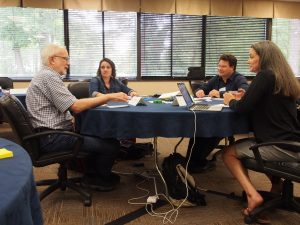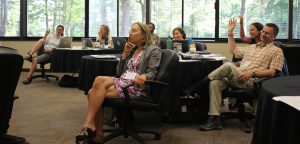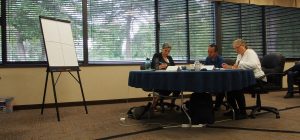
Photo by Lauren Thomas at Hudson Valley One
Scientists who find themselves in leadership roles wear a lot of different hats: researcher, project manager, program manager, human resources, grant manager, education and outreach coordinator, science communicator, financial manager, the list goes on. While some of these skills are touched upon during a scientist’s studies, the focus of a master’s or Ph.D. is so centered on developing science skills that it can be difficult to identify and use those acquired management tools down the road. SBI Alumna Elizabeth Long oversees the Daniel Smiley Research Center of the Mohonk Preserve in upstate New York. Her experiences transitioning from academia to Director of Conservation Science highlights the benefits of SBI training for those who find themselves in a wide variety of leadership roles.
Elizabeth was trained to be a scientist, and she quickly identified that this role of Director of Conservation Science required more than her science skills. Seeking that structure and methodology scientists love, she sought out SBI training. Our courses promise the skills necessary for scientists to excel in the managerial aspects of their jobs and provides tools that establish structure for abstract concepts like program sustainability and self-sufficiency.
[perfectpullquote align=”full” bordertop=”false” cite=”” link=”” color=”” class=”” size=””]“I had all the training for the job in terms of the science skills I needed, but in graduate school, they don’t teach you these types of skills you need when you’re running a field station or trying to keep a self-funded project up and running.”[/perfectpullquote]
The Mohonk Preserve is an 8,000-acre land trust, preserve, environmental research center, and environmental education center. The Preserve has been studying the biotic and abiotic components of ecosystems found in upstate New York for over 100 years. With such a strong sense of tradition in many of the Preserve’s programs, Elizabeth used matrix mapping and mission and vision statements to look objectively at some of their programs.
Through matrix mapping, Elizabeth was able to strike a balance between tradition and the viability of projects. Asking tough questions like is this project fulfilling our goals? Is it sustainable? Does it align with our mission and vision statements? This helped them keep better track of their projects and reprioritize their time and resources.
[perfectpullquote align=”full” bordertop=”false” cite=”” link=”” color=”” class=”” size=””]“Tradition and history need to be balanced with profitability. Nothing should be safe, and everything should be evaluated regularly. Learning to take the emotion out of programmatic decisions has been so critically important to our program”[/perfectpullquote]
One project that came to the forefront was digitizing the research center’s archival data. This project would tackle digitizing over 100 years of data, including almost 1,000 species and abiotic parameters. This aligned perfectly with the Mohonk Preserve Conservation Science Goal “[to] research and document information about the natural environment of the Shawangunk Ridge, provide access to the scientific information we produce, promote connections to a variety of research user groups, and further engage the general public through citizen science.” (Mohonk Preserve Strategic Plan, 2020) This project won’t end upon digitizing the past 100 years, as long as the center is generating data, there will be a need for constant updating.
Elizabeth recognized the challenges that came with this project; to properly champion this endeavor, they needed a diverse and sustainable funding portfolio. Elizabeth secured an Institute for Museum and Library Services grant to begin this work and is well-equipped with the foresight necessary to develop a financial plan that will carry this work into the future. Coincidentally, Elizabeth’s favorite part of her SBI course training was the financial management sessions. “It really changed my approach to my budget and our finances…I’m presenting our needs to funders and donors, not just a dollar amount.” We have no doubt that the lessons learned from those sessions will help Elizabeth and the Daniel Smiley Research Center secure a wide variety of funding for their digitization project.
Elizabeth pointed out how her SBI skills have been transformative in all aspects of her work, including handling unexpected challenges like a global pandemic. She pointed out how leadership roles come in all shapes and sizes in the field of science, and all of them can benefit from the structure and tools provided by SBI courses. “You don’t know what you don’t know,” she said, “there are a lot of skills that you already have, but you might not be thinking of them in the framework of how to keep an organization, a research center, a lab, or a research project, up and running. This course will help you reframe and organize your skills, and it will also help you identify areas where you need more training or more practice.”
Elizabeth and the Daniel Smiley Research Center is one of over 100 biological infrastructure projects the SBI Training Initiative has helped to reframe thoughts about strategic planning, financial management, and communication. We take pride in drawing parallels between the structure scientists know and love and the skills they need. We love hearing about our Alumni’s continued success and the ‘ah-ha’ moments that allowed them to make amazing strides towards programmatic sustainability. To learn more about the Mohonk Preserve and Elizabeth’s work with the Daniel Smiley Research Center, visit their website. And to learn how you can follow in Elizabeth’s footsteps and improve your space for science, check out our latest course offerings.




